|
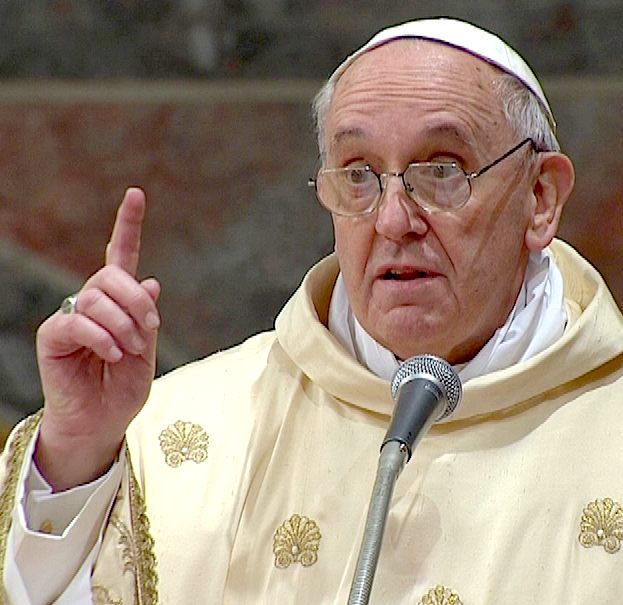
Pope
Benedict XVI
Each pope is part of what Catholicism calls the apostolic succession, an unbroken line back to
Saint Peter and has supreme authority. The current pontiff,
Francis (Benedict XVI) is the 265th pope and succeeded John Paul II in 2005.
He is a progressive thought leader.
Pope Francis (Latin: Franciscus; Italian: Francesco; Spanish: Francisco; born Jorge Mario Bergoglio, 17 December 1936) is the head of the Catholic Church, the bishop of Rome and sovereign of the Vatican City State. Francis is the first pope to be a member of the Society of Jesus, the first from the Americas, the first from the Southern Hemisphere, and the first pope from outside Europe since Gregory III, a Syrian who reigned in the 8th century.
Born in Buenos Aires, Argentina, Bergoglio worked for a time as a bouncer and a janitor as a young man before training to be a chemist and working as a technician in a food science laboratory. After recovering from a severe illness, he was inspired to join the Society of Jesus (Jesuits) in 1958. He was ordained a Catholic priest in 1969, and from 1973 to 1979 was the Jesuit provincial superior in Argentina. He became the Archbishop of Buenos Aires in 1998 and was created a cardinal in 2001 by Pope John Paul II. He led the Argentine Church during the December 2001 riots in Argentina. The administrations of Néstor Kirchner and Cristina Fernández de Kirchner considered him to be a political rival.
Following the resignation of Pope Benedict XVI on 28 February 2013, a papal conclave elected Bergoglio as his successor on 13 March. He chose Francis as his papal name in honor of Saint Francis of Assisi. Throughout his public life, Francis has been noted for his humility, emphasis on God's mercy, international visibility as pope, concern for the poor, and commitment to interreligious dialogue. He is credited with having a less formal approach to the papacy than his predecessors, for instance choosing to reside in the Domus Sanctae Marthae guesthouse rather than in the papal apartments of the Apostolic Palace used by previous popes.
Francis maintains the views of the church regarding the ordination of women as priests, but has initiated dialogue on the possibility of deaconesses and has made women full members of dicasteries in the Roman Curia. He maintains that the church should be more open and welcoming for members of the LGBT community. Francis is an outspoken critic of unbridled capitalism and free market economics, consumerism, and
over-development; he advocates taking action on climate
change, a focus of his papacy with the promulgation of Laudato si'. In international diplomacy, he helped to restore full diplomatic relations between the United States and Cuba, supported the cause of refugees during the European and Central American migrant crises, and made a deal with China to define how much influence the nation has in appointing their Catholic bishops. He has faced criticism from theological conservatives on many questions, especially what some interpret as his suggestion in a footnote of Amoris Laetitia that divorced and remarried Catholics may be admitted to receive the Eucharist.
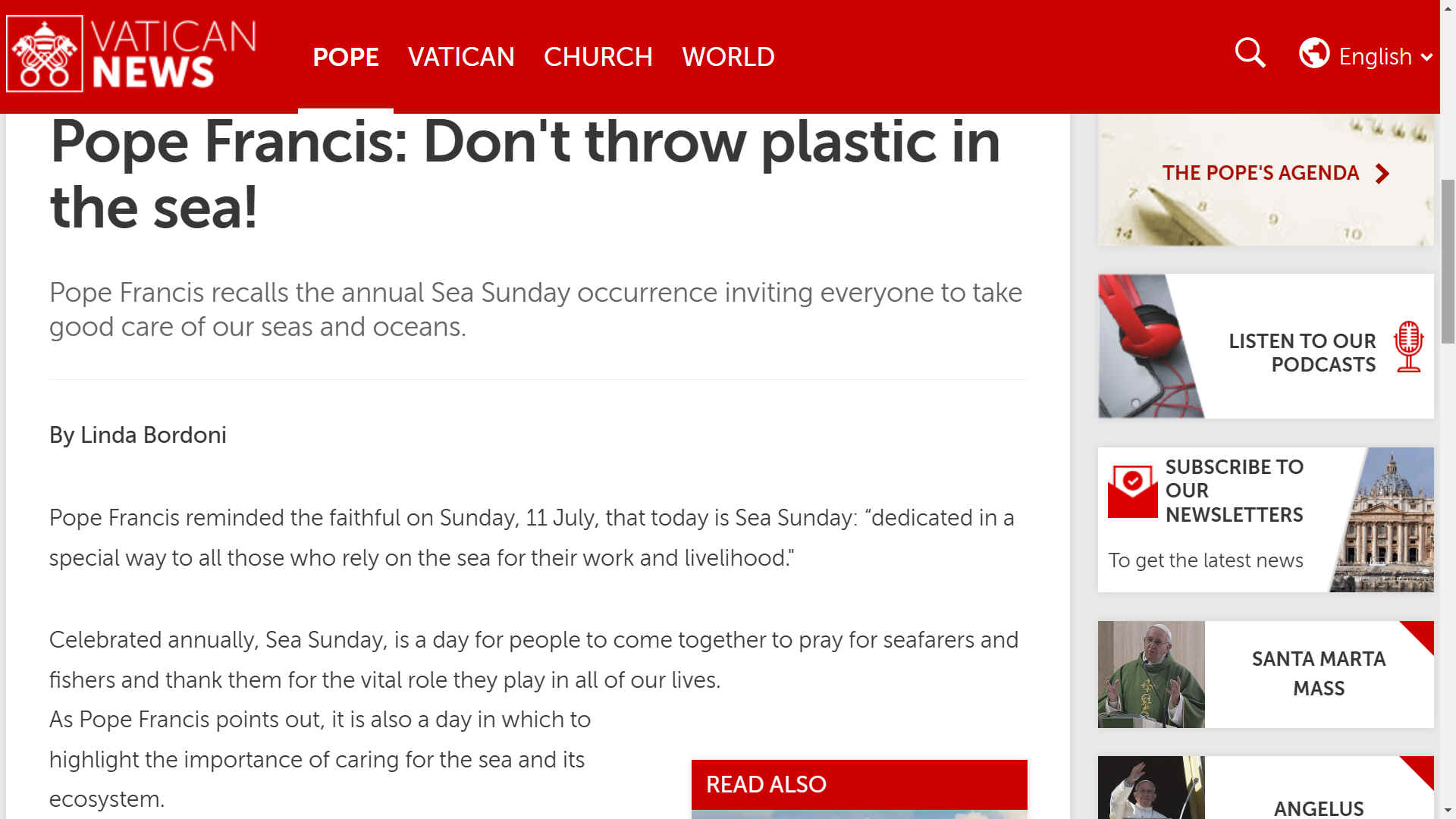
SELECTION
Elected at 76 years old, Francis was reported to be healthy and his doctors have said his missing lung tissue, removed in his youth, does not significantly affect his health. The only concern would be decreased respiratory reserve if he had a respiratory infection. In the past, one attack of sciatica in 2007 prevented him from attending a consistory and delayed his return to Argentina for several days. Francis is the first Jesuit pope. This was a significant appointment, because of the sometimes tense relations between the Society of Jesus and the Holy See. However, Bergoglio came in second to Cardinal Ratzinger on all the ballots in the 2005 conclave, and at the time appeared as the only other viable candidate. He is also the first from the Americas, and the first from the Southern Hemisphere. Many media reported him as being the first non-European pope, but he is actually the 11th; the previous was Gregory III from Syria, who died in 741. Moreover, although Francis was not born in Europe, he is ethnically European; his father and both of his mother's parents are from northern Italy.
As pope, his manner is less formal than that of his immediate predecessors: a style that news coverage has referred to as "no frills", noting that it is "his common touch and accessibility that is proving the greatest inspiration." On the night of his election, he took a bus back to his hotel with the cardinals, rather than be driven in the papal car. The next day, he visited Cardinal Jorge María Mejía in the hospital and chatted with patients and staff. At his first media audience, the Saturday after his election, the pope explained his papal name choice, citing Saint Francis of Assisi as "the man who gives us this spirit of peace, the poor man", and he added "how I would like a poor Church, and for the poor".
In addition to his native Spanish, he speaks fluent Italian (the official language of Vatican City and the "everyday language" of the Holy See) and German. He is also conversant in Latin (the official language of the Holy See), French, Portuguese, and English, and he understands the Piedmontese language and some Genoese.
Francis chose not to live in the official papal residence in the Apostolic Palace, but to remain in the Vatican guest house, in a suite in which he can receive visitors and hold meetings. He is the first pope since Pope Pius X to live outside the papal apartments. Francis still appears at the window of the Apostolic Palace for the Sunday Angelus.
As a Jesuit pope, he has been "making clear that a fundamental task of the faithful is not so much to follow rules but to discern what God is calling them to do. He is altering the culture of the clergy, steering away from what he has named as “clericalism” (which dwells on priestly status and authority) and toward an ethic of service (Francis says the church’s shepherds must have the “smell of the sheep,” always staying close to the People of God)."
THE VATICAN BANK - INSTITUTE FOR THE WORKS OF RELIGION
Francis was mandated by electing cardinals to sort out Vatican finances following scandals during the papacies of Pope Benedict and Pope John Paul II. He stated he is determined to end corruption in the Catholic Church but is not very optimistic due to it being a human problem dating back centuries.
In the first months of Francis's papacy, the Institute for the Works of Religion, informally known as the Vatican Bank, said that it would become more transparent in its financial dealings There had long been allegations of corruption and money laundering connected with the bank. Francis appointed a commission to advise him about reform of the Bank, and the finance consulting firm Promontory Financial Group was assigned to carry out a comprehensive investigation of all customer contacts of the bank on these facts.
Because of this affair the Promoter of Justice at the Vatican Tribunal applied a letter rogatory for the first time in the history of the Republic of Italy at the beginning of August 2013. In January 2014, Francis replaced four of the five cardinal overseers of the Vatican Bank, who had been confirmed in their positions in the final days of Benedict XVI's papacy. Lay experts and clerics were looking into how the bank was run. Ernst von Freyberg was put in charge. Moneyval feels more reform is needed, and Francis may be willing to close the bank if the reforms prove too difficult. There is uncertainty how far reforms can succeed.
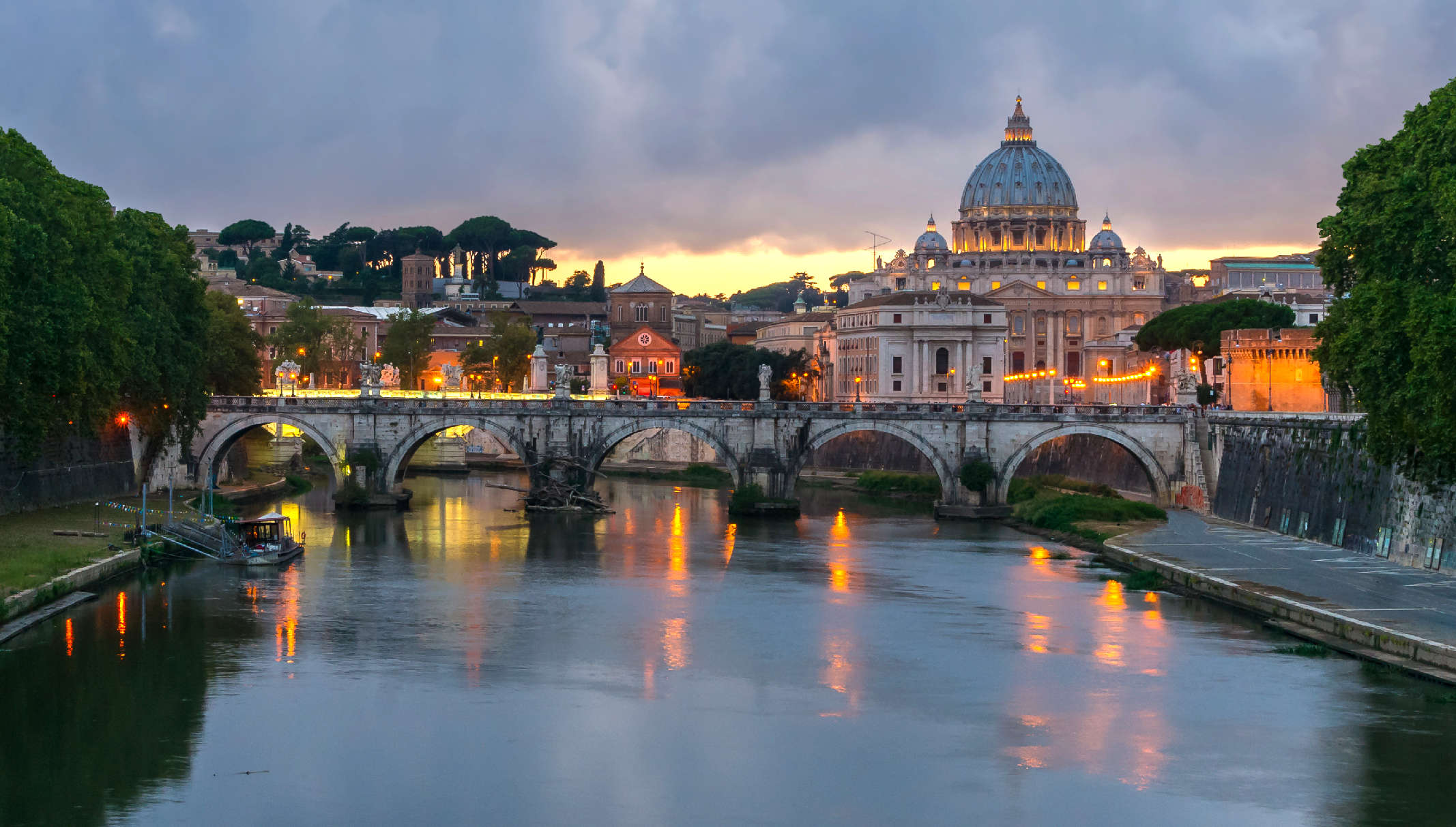
OCEAN PLASTIC POLLUTION
- SEA SUNDAY - JULY 2021
Pope Francis recalls the annual Sea Sunday occurrence inviting everyone to take good care of our seas and oceans.
Pope Francis reminded the faithful on Sunday, 11 July, that today is Sea Sunday: “dedicated in a special way to all those who rely on the sea for their work and livelihood."
Celebrated annually, Sea Sunday, is a day for people to come together to pray for seafarers and fishers and thank them for the vital role they play in all of our lives.
As Pope Francis points out, it is also a day in which to highlight the importance of caring for the sea and its ecosystem.
Speaking after the Angelus prayer, the Pope said he is praying for seafarers and he exhorted everyone to take care of the oceans and of the seas.
“Take care of the health of the sea: no plastic in the sea!” he said.
8 MILLION TONS OF PLASTIC ENTER THE OCEAN EVERY YEAR
UN figures show 8 million tons of plastic enter the ocean annually, killing marine life and feeding into the human food chain.
Pope Francis makes many references to the need to care for oceans and seas in his encyclical “Laudato sì, On Care for Our Common Home”. In paragraphs 40-41, he writes: "Oceans not only contain the bulk of our planet’s water supply, but also most of the immense variety of living creatures, many of them still unknown to us and threatened for various reasons...Particularly threatened are marine organisms which we tend to overlook, like some forms of plankton; they represent a significant element in the ocean food chain, and species used for our food ultimately depend on them...In tropical and subtropical seas, we find coral reefs comparable to the great forests on dry land, for they shelter approximately a million species, including fish, crabs, molluscs, sponges and algae. Many of the world’s
coral reefs are already barren or in a state of constant decline. 'Who turned the wonderworld of the seas into underwater cemeteries bereft of colour and life.'"
In a letter to business leaders at a 2018 Vatican conference on the fourth World Day of Prayer for the Care of Creation, he said “We cannot allow our seas and oceans to be littered by endless fields of floating plastic.”
“We need to pray as if everything depended on God’s providence, and work as if everything depended on us,” he said.
DECEMBER 2015 - The Vatican is lending itself to environmentalism with a special public art installation timed to coincide with the final stretch of climate negotiations in Paris.
On Tuesday night, the facade of St. Peter's Basilica will be turned into a massive backdrop for a photo light show about nature organized by several humanitarian organizations.
The initiative, featuring images by National Geographic and well-known photographers including Sebastiao Salgado, is similar to ones that used the U.N. headquarters and the Empire State Building in New York as backdrops.
Pope Francis has strongly backed the environmental cause, issuing a landmark encyclical in which he blasted the fossil-fuel-based economy for impoverishing much of humanity and destroying the planet.
APRIL 30 2014 - Global Ocean Commission Co-chair Trevor Manuel met with His Holiness Pope Francis at the Vatican to discuss the future of the global ocean. At a private audience Co-chair Trevor Manuel presented Pope Francis with the Commission’s vision for stronger high seas governance and protection, a copy can be read in Latin here, together with other Commission briefings in Spanish.
Today’s visit was the final day of a three-day delegation to the Vatican. The Commission’s visit began with a meeting with Cardinal Turkson, the Chair of the Pope’s Council on Justice and Peace, which advises the Holy Father on social and environmental affairs. The meeting was an opportunity to discuss the place of the global ocean as a focus area for the Commission and the Holy Father who is known to be developing an encyclical on the Church and the Environment.
The Commission delegation, headed by Trevor Manuel and Executive and Deputy Executive Secretaries
Simon Reddy and
Rémi Parmentier, also held a meeting with the Vatican’s Secretary for Relations with States, Cardinal Dominique Mamberti. This was an opportunity to discuss the role of the United Nations, governments and the Church to further advance the cause of ocean conservation and management.
Reflecting on his visit to the Vatican, Co-chair Trevor Manuel said: “All our meetings at the Vatican were a great opportunity to identify possible synergies and areas of collaboration with the Vatican and to discuss the role of faith groups in disseminating the social and environmental aspects of
ocean management and conservation.”
Manuel added: “In the course of its work, the Global Ocean Commission has recognized that the issues facing the oceans are value issues as much as policy issues, for example with regard to the equitable sharing of resources found in the high seas and their conservation for the benefit of future generations.
Furthermore, there is a moral obligation for us all to ensure adequate stewardship of our ocean environment and resources. We are hopeful that under the leadership of the Holy Father, the Church will step up its reflection and action to contribute to a wiser use of marine resources.” The Commission aims to reach out to all global leaders and opinion-makers in the run up to the launch of its final report in New York on 24 June.
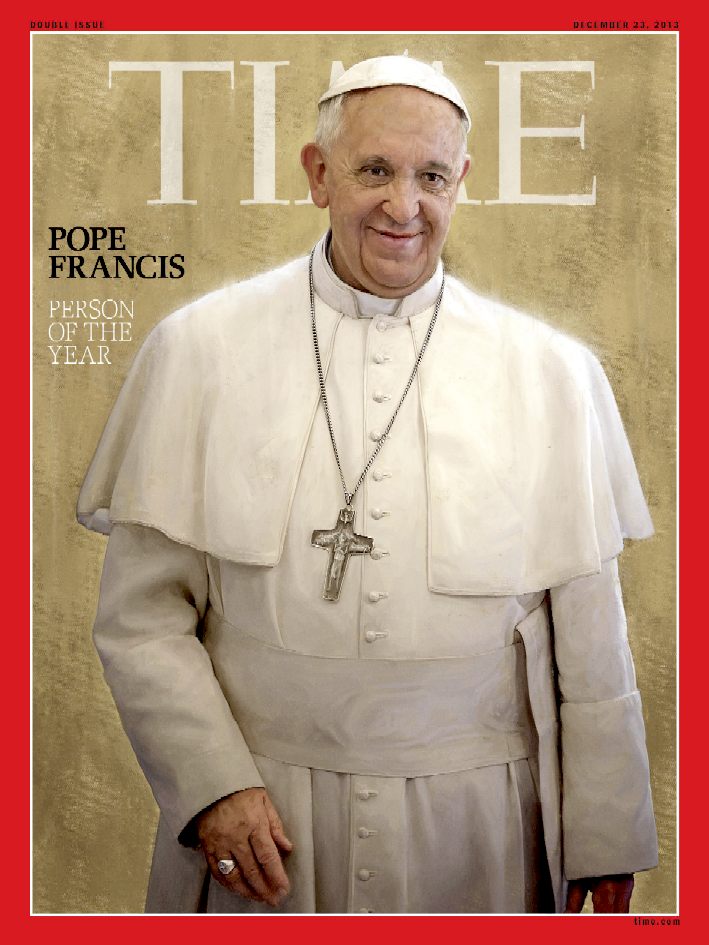
CLIMATE CHANGE 5 MAY 2015
A declaration at the end of a meeting in Rome hosted by the Vatican made a plea to the world’s religions to engage and mobilize on the issue of
climate
change.
“Human-induced climate change is a scientific reality, and its decisive mitigation is a moral and religious imperative for humanity,” the declaration said. “In this core moral space, the world’s religions play a very vital role.”
Vatican watchers and climate experts say the meeting, “The Moral Dimensions of Climate Change and Sustainable Development,” shows that Pope Francis is - in marked contrast to his predecessors - keen for the Catholic church to be more involved in the climate change issue, and is also urging other religions to become more actively engaged.
The meeting was organized by various religious and non-religious organizations, including the Vatican’s Pontifical Academy of Sciences and the UN-affiliated body, the Sustainable Development Solutions Network. Ban Ki-moon, the UN Secretary-General, also spoke at the one-day conference.
“If we destroy Creation, Creation will destroy us,” the Pope told a gathering of thousands in St Peter’s Square, Rome, last month. “Never forget this.”
Members of the Heartland Institute, a US-based organization funded by billionaire industrialists and others who deny climate change is caused by human activity, travelled to Rome to speak against the meeting.
“The Pope has great moral authority, but he’s not an authority on climate science,” a Heartland employee told the UK newspaper, the Daily Telegraph.
“The Pope would make a grave mistake if he put his moral authority behind scientists saying that climate change is a threat to the world.”
We disagree wholeheartedly, thanking the Bishop of Rome for his clarity, in a world where obfuscation is a brake to repair. Vast profits have a way of clouding the
judgment of investors in fossil
fuels.
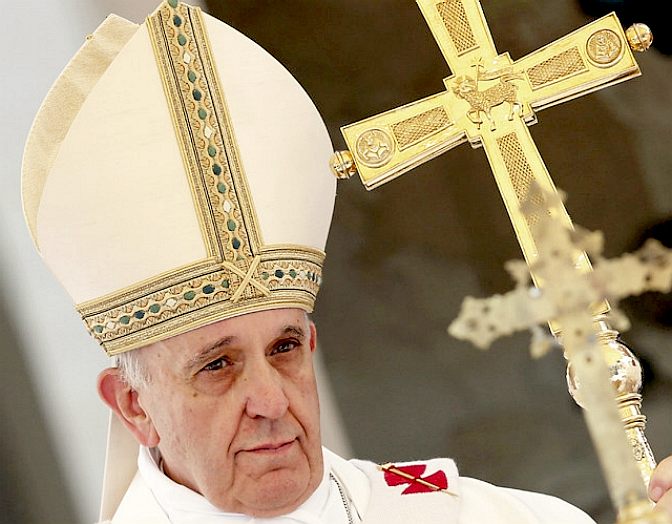
UKRAINE WAR
Following the February 2022 Russian invasion of Ukraine and escalation of the Russo-Ukrainian War, Francis visited the Russian embassy in Rome in what was described as an "unprecedented move." Francis called Ukrainian president Volodymyr Zelenskyy, stating his "sorrow" as the Vatican worked to find "room for negotiation."
As the invasion began, the major archbishop of the Ukrainian Greek Catholic Church Sviatoslav Shevchuk cancelled a trip to visit Francis in Florence. On 25 February, the day after the invasion began, Francis would assure Shevchuk via a phone call that "he would do everything he can to help end the Ukraine conflict." During the 27 February Angelus address, Francis called for peace, saying, "Silence the weapons!"
In mid-May 2022, Francis described Russia's invasion of Ukraine as "perhaps somehow either provoked or not prevented.” Francis explained that this observation did not mean he was "pro-Putin": "“It would be simplistic and wrong to say such a thing. I am simply against reducing complexity to the distinction between good guys and bad guys, without reasoning about roots and interests, which are very complex.”
In
2015 Germany, with Ursula
Von der Leyen as defence minister, accepted that Russia
was a risk, but continued to import oil and gas, as did
other European nations - without any assurances as to
non-aggressive stance. India and China were also hungry for
Soviet oil. Signalling to Vladimir Putin that the East and
West would allow the former FSB officer, to walk into the
Ukraine unchallenged. What were they thinking. The same is
true of reliance on Chinese imports of lithium batteries and
solar panels. Such imbalances that fuel treasuries, could
also lead to aggression.
The
invasion has spurred the EU and USA to invest significantly
more in hydrogen production from renewables, as a way to
counter dependency on oil producing states, who tend to
squander the wealth so generated.
In September 2022, Francis pointed out that Ukraine has a lawful right to defend itself, and that dialogue with the aggressor is necessary even when it stinks and later said that Ukrainians were noble people who were victims of savageness, monstrosities and torture.
HISTORY
The Vatican palace is the residence of the pope within the city walls. The Holy See is the name given to the government of the Roman Catholic Church, which is led by the
Pope as the bishop of Rome. As such, the Holy See’s authority extends over Catholics throughout the world. Since 1929 it has resided in Vatican City, which was established as an independent state to enable the pope to exercise his universal
authority from within a secure location.
According to legend, the city of Rome was founded in 753 BC on the banks of the Tiber about 25 km (16 mi) from the sea at Ostia. Tiber Island, in the center of the river between Trastevere and the ancient city center, was the site of an important ancient ford and was later bridged. Legend says Rome's founders, the twin brothers Romulus and Remus, were abandoned on its waters, where they were rescued by the she-wolf, Lupa.
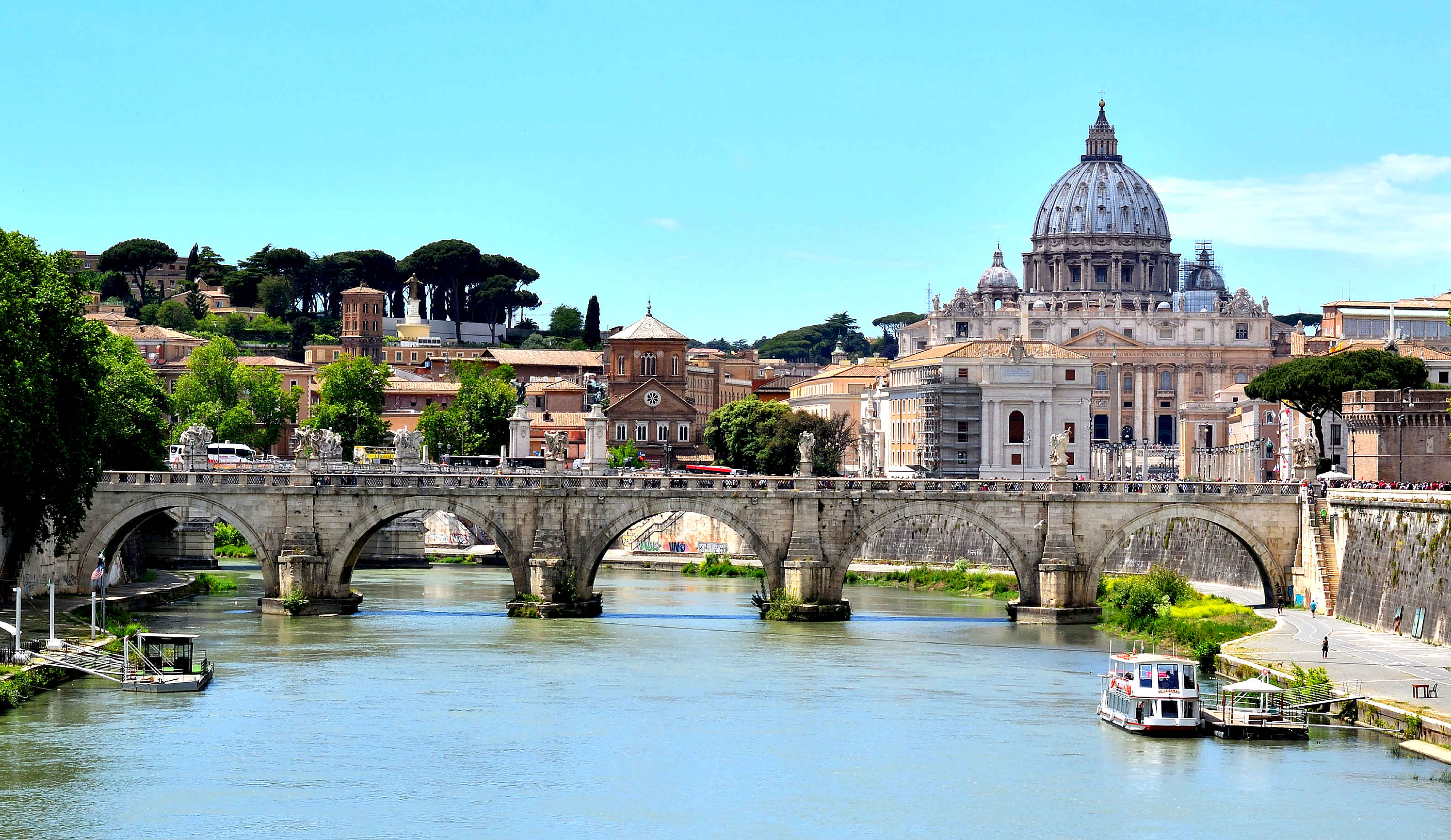
JOHN
STORM
In
this fictional series, our hero is strongly opposed to all
forms of pollution. Including social, political and
religious. He is a
conservationist first, and an activist second. Leading by
example. John
Storm captains a zero
emission solar
and hydrogen
powered ship called the Elizabeth
Swann.
John
Storm eats a healthy diet, and prefers to drive electric
vehicles, whenever possible. He owns an electric
Jeep, that
he converted himself. Though, it can run on methanol,
using the original 4.0 liter petrol powered, internal
combustion engine.
Following
a request by (the fictional) Pope
Peter Benedict, for a consultation with John, he is
tasked with navigating the Tiber in the Elizabeth
Swann, to conveniently reach the Vatican
City. Only to find that is not as easy as Google maps
make it appear, and that there is little information on the
subject. Mainly because of the narrowness of some of the
ancient Roman bridges, with stone arch spans, not conducive
to wide multi-hulled vessels. But then of course, how many
people would want to travel upriver in a large boat. It was
a rather unusual request, necessary only inasmuch as the
Swann is a mobile floating laboratory.
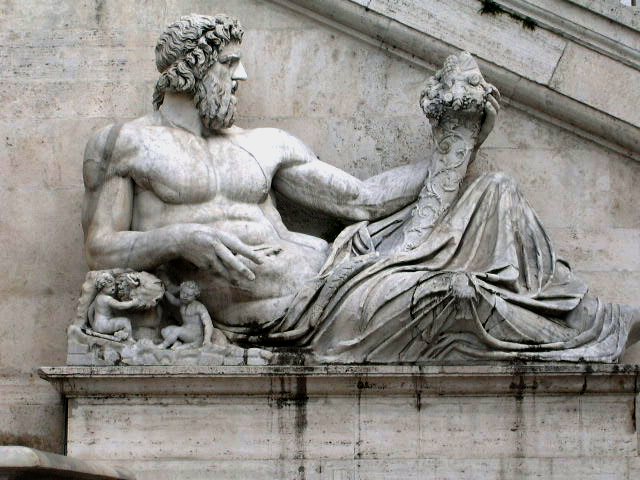
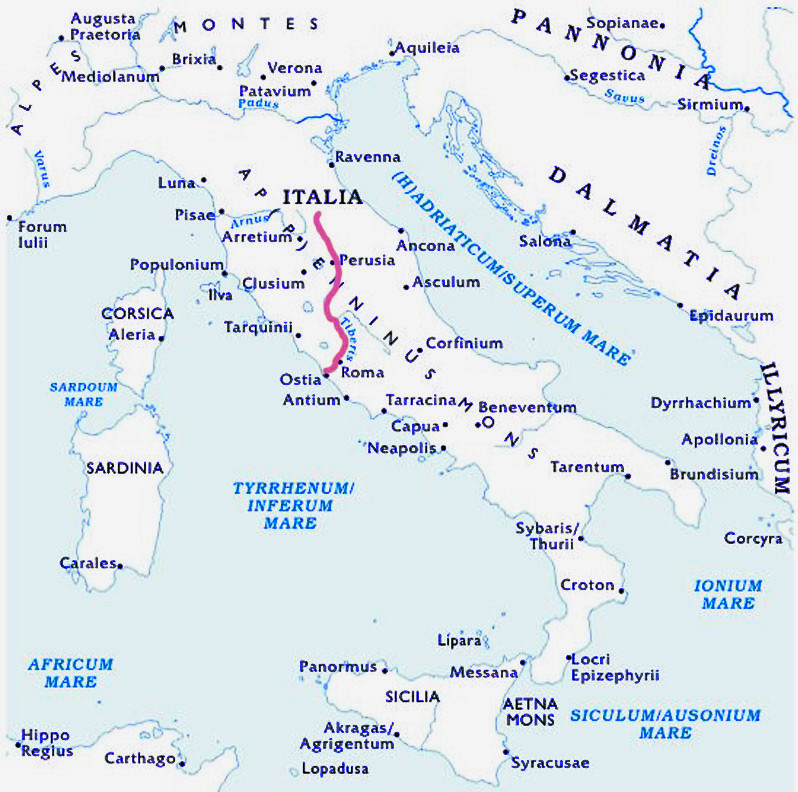
Sculpture
of the Roman God Tiberious, and map showing the
River Tiberis, in Italy.
REFERENCE
https://
|







